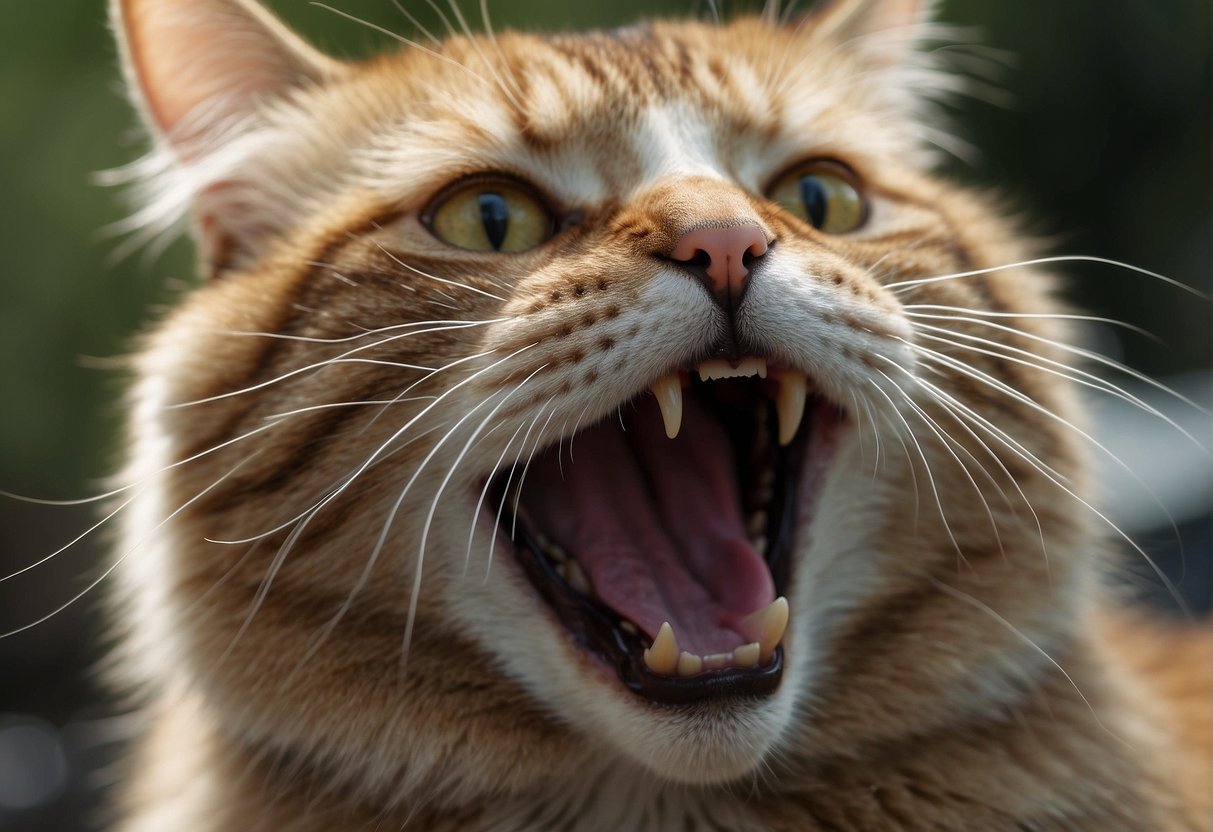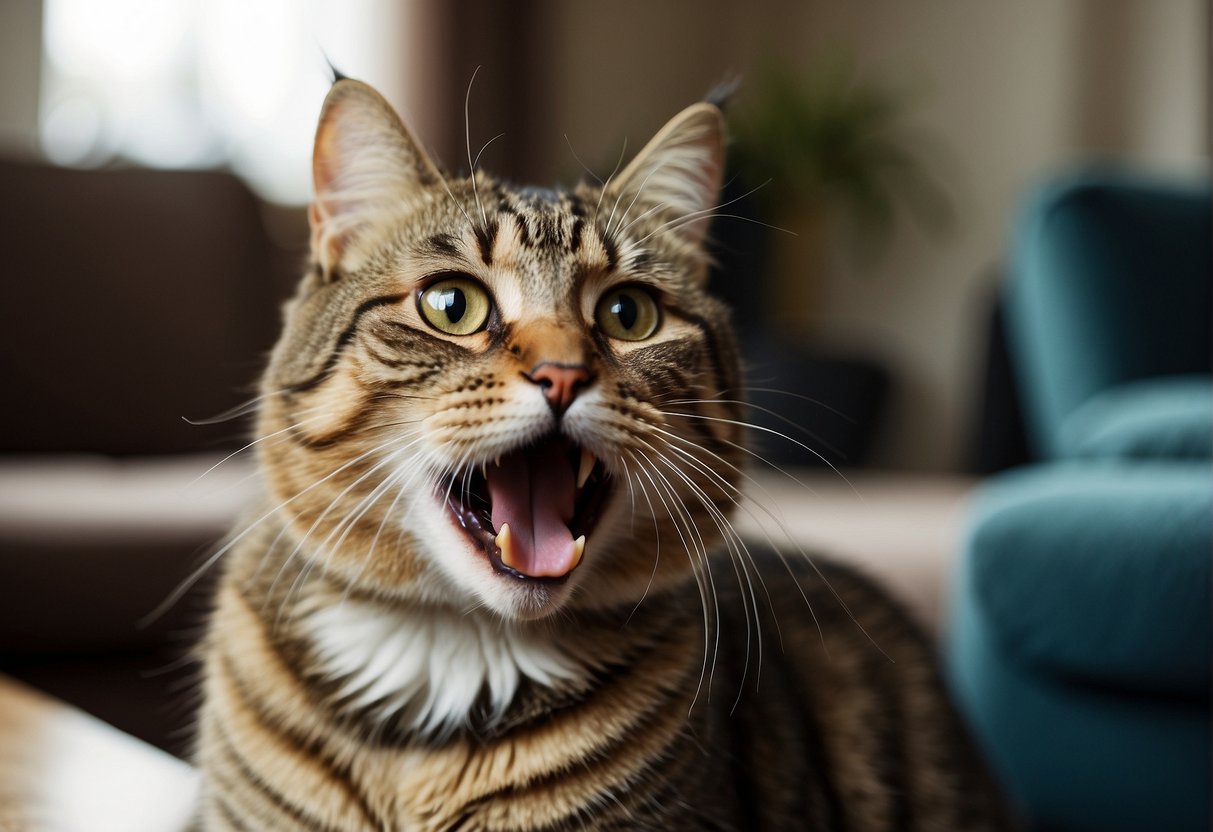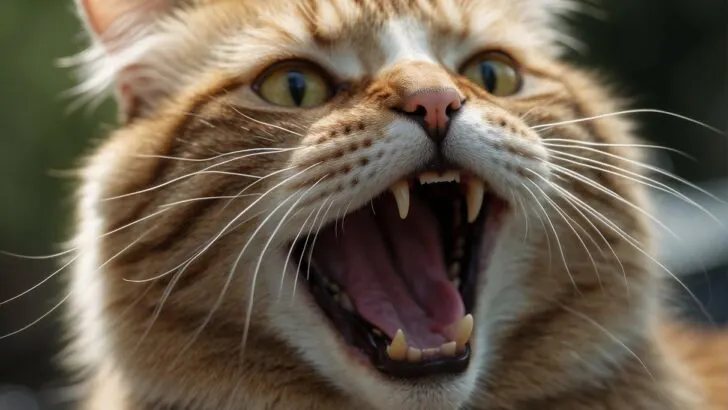Bad breath in cats is often a symptom that shouldn’t be ignored, as it can indicate underlying health issues. Yours may have bad breath for a variety of reasons, from something as simple as what they’ve just eaten to more serious health problems such as dental disease or kidney issues.
I’ve noticed, for instance, after a tuna-flavored treat, the aftermath can be less than pleasant on the breath front. And let’s not disregard dental health; tartar build-up and plaque can lead to nasty breath and are signs to check in on your furry friend’s oral hygiene.

Beyond diet and dental woes, other health concerns could be the culprit. Kidney disease, with an accompanying ammonia-like breath odor, or diabetes, indicated by a fruity-smelling breath, are serious conditions that require immediate attention.
Ensuring regular check-ups, proper dental care, and monitoring your cat’s diet are excellent preventive measures. It’s important to not just shrug off stinky breath as ‘typical cat behavior,’ as addressing it early can make a world of difference to your cat’s health.
Common Causes of Feline Halitosis

When your cat greets you with a purr and a breath of air that’s less than fresh, it might be more than just a small nuisance—it can be a sign of health issues. Let’s explore some common culprits of your feline’s halitosis.
Dental Issues
Bad breath in cats is often rooted in dental disease such as gingivitis (inflammation of the gums) or periodontal disease, an infection resulting from buildup of plaque and tartar on the teeth. When left unchecked, these conditions can lead to significant oral health problems involving bacteria that produce foul odors.
- Gingivitis: Red, swollen gum line; often reversible with proper dental care.
- Periodontal Disease: Advanced gingivitis potentially leading to tooth loss.
Diet and Digestive Health
What your cat eats can directly impact their breath. Foods that don’t sit well with your cat’s digestive system might cause unpleasant mouth odors. Additionally, gastrointestinal issues, like a blockage caused by ingesting a foreign object, can result in halitosis.
- Diet Related Issues: Some foods may cause bad breath more than others.
- Digestive Disorders: Can include anything from a simple upset stomach to more serious conditions.
Underlying Medical Conditions
Halitosis can also signal internal health problems. For instance, kidney disease might make your cat’s breath smell like ammonia, while diabetes can give it a sweet or fruity odor. Liver disease and respiratory infections could also be underlying factors contributing to stinky breath.
- Kidney Disease: Ammonia or urine-like breath smell, along with symptoms like lethargy and weight loss.
- Diabetes and Liver Disease: Sweet, fruity breath or other unusual smells that prompt further investigation.
Diagnosis and Professional Care
When your cat’s breath starts to clear a room, it’s time to consult your veterinarian. The stink can be a sign of underlying health issues, and only a professional can pinpoint the exact cause and prescribe the right treatment.
Veterinary Examination
Your first step should be a thorough veterinary examination. During the visit, the veterinarian will check for signs of dental problems like plaque buildup, gingivitis, and any other oral abnormalities.
They will also assess your cat’s overall health, looking for symptoms of systemic diseases such as kidney issues, diabetes, or infections. Don’t be surprised if the vet suggests diagnostic tests like blood tests or x-rays; these can be crucial in confirming a diagnosis.
- Signs to mention to your vet:
- Bad breath
- Visible plaque or tartar
- Reduced appetite or weight loss
- Lethargy or changes in behavior
Treatment Options
The treatment your vet recommends will depend on the diagnosis. For dental issues, a professional teeth cleaning might be necessary, which could involve scaling and polishing under anesthesia. If a medical condition is causing the bad breath, various treatment options may include:
- Medication: Antibiotics if infection is present.
- Dietary Changes: Specially formulated foods for dental health or specific medical conditions.
- Regular Monitoring: Follow-up appointments to track your cat’s health.
Remember: Timely treatment not only freshens breath but also prevents more serious health problems down the line. As a caring cat owner, keeping an eye on your furry friend’s oral hygiene can make all the difference.
Home Care and Prevention
Taking control of your cat’s oral health will not only freshen their breath but also contribute to their overall well-being. Let’s explore practical steps you can take right at home.
Dental Hygiene Practices
Tooth Brushing: Incorporate tooth brushing into your routine to combat dental plaque and maintain fresh breath.
Begin with a cat-specific toothbrush that’s appropriately sized for your feline friend’s mouth. When selecting toothpaste, always choose a feline-friendly option, as human toothpaste can be harmful to cats.
Start slowly, perhaps with just the toothbrush at first, allowing your cat to get used to the sensation. Over time, ideally brush their teeth several times a week.
Home Remedies:
- Dental Toys: Offer toys designed to clean teeth while they play.
- Dental Treats: Use treats that help reduce plaque and freshen breath.
- Diet Choices: Feed your cat dry food, which can reduce tartar buildup.
Regular Health Check-Ups
In addition to home care, it’s vital to schedule regular veterinary check-ups to ensure your cat’s mouth is healthy. During these visits, a professional can examine your cat’s mouth for signs of dental disease and provide recommendations tailored to your pet’s specific needs.
Early detection and professional cleaning can prevent the progression of dental issues that could be the source of bad breath.
Remember, dental disease can be gradual, and your cat may not show discomfort until it’s advanced.

My name is James, and welcome to FAQCats!
Along with our team of cat owners, expert pet enthusiasts, and pet professionals, we aim to write engaging helpful, engaging content about cats. At FAQCats we strive to provide content that’s accurate and fun to read. Our team writes about everything related to cats; even the most complex of topics. Through extensive research and caring for our own fur-pals, we’re able to provide something cat owners worldwide will love. Have a look around, and leave us feedback anytime!

